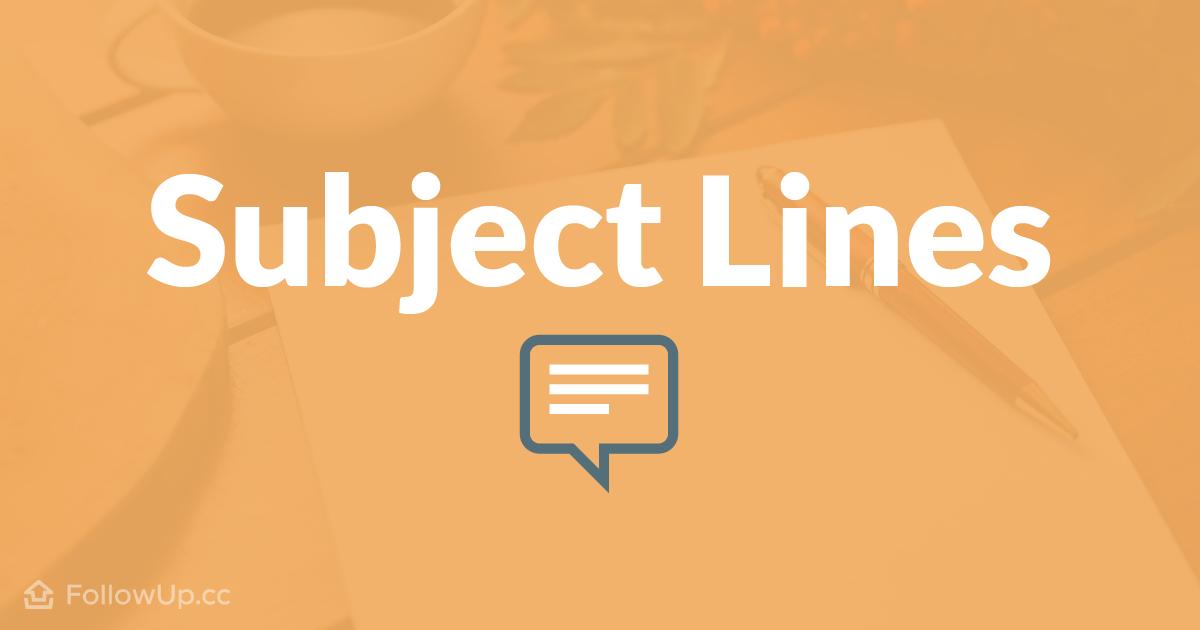6 Types of Subject Lines That Will Improve Your Open Rates
Your email could contain the secrets of the universe – but if your subject line stinks, no one is going to read it. While there is no magic formula to create the perfect subject line, there are a few tried-and-true tactics that consistently get awesome results. Try one of these subject line types on your next email and watch your open rates soar.
Short and sweet
Did you know that subject lines with 30 characters or less have an above-average open rate? It makes sense considering that 40 percent of emails these days are opened on mobile first, where you can only fit between 4-7 words (and even less if you’re opening emails on an Apple Watch).
Take advantage of all those short attention spans out there by keeping the most important information at the very beginning of your subject line. Keep it short, simple and to the point, like in the examples below.


Pro-tip: If you have a lot to say, take advantage of the preview text (that short blurb that your subscribers see right after the subject line).
Clear and concise
Your subject line should be relevant to the information in your email – this isn’t the place to get creative! Tell people exactly what’s inside and don’t mislead them. Speak to the benefits of your content. If you’re sharing tips for grooming your guinea pig, tell people how many tips are inside your email. If you’re explaining to your audience how to make guinea pig chow, your subject line line could simply be, “How to Make Your Own Guinea Pig Chow.”
Check out these other ideas for clear and concise subject lines.


Pro-tip: If you’re sending a newsletter that covers multiple articles or topics, focus on just one in your subject line.
Time-sensitive
Do your customers have FOMO? That is, fear of missing out? Most people do, and that’s why creating a sense of urgency in your emails is such an effective way to drive engagement. Nobody wants to miss a great sale, webinar, podcast or other opportunity.
If your email is time-sensitive, communicate in your subject line when your offer runs out. Don’t send your email at the very last minute – make sure your subscribers have enough time to take advantage of your offer!


Pro-tip: Take it easy on the exclamation points and caps – you don’t want your subscribers to feel like they’re getting yelled at!
Sales specific
If you sell products or services online, email is a great way to promote your sales. In your subject line, be super specific about what you’re promoting and how much your subscribers will save. Include price, percentage off and which products are on sale. Here are a few good examples.


Pro-tip: Don’t overload your subscribers with too many sale emails. They may feel bombarded and start ignoring your messages altogether.
Ask a question
A subject line with a question can inspire curiosity from your subscribers. They make your emails feel more approachable and conversational, which helps your readers connect with you. If your email addresses a controversial topic, you can ask for your reader’s opinion in the subject line: “What do you think about kitten mittens?”

If you’re sending your readers a survey, you can turn one of your survey questions into a subject line to get your subscribers thinking like Kayak does in the example below.

Pro-tip: No matter what question you ask, allow your subscribers to hit reply so they can respond directly to your email.
Personalized or personal
Address your subscribers by name, and you’ll grab their attention: emails with personalized subject lines are 20 percent more likely to get opened. Save personalization for the emails you really need more eyes on – don’t overdo it!

Another way to get personal in the subject line is to address your readers directly, as though you were writing to a friend. Check out the example below.

Pro-tip: Try personalization in the body of your email to deliver a more contextual email experience.
What’s next?
To find out which types of subject lines your audience likes best, pick two that I’ve mentioned here that make the most sense for your business. Or combine a few!
Then run an A/B split test to find your winner. Leverage what works, then test again. The type of subject line that works for your audience today might not be as effective six months from now. Watch your open rates closely so you can adapt and improve.
Republished with permission from AWeber.com.
Latest posts by David Candelas (see all)
- Use a SMART Goal Template to Hack Your Productivity - December 11, 2020
- Is LinkedIn Worth Your Time as a Salesperson? - November 24, 2020
- Tips for Starting the Home Office of Your Dreams - November 29, 2019


